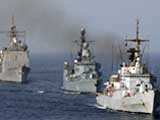Pirates and their millions
By Andrew D Bishop for ISN
A couple of weeks ago, a external page prank Bloomberg wire went around the internet claiming Somali pirates had decided to buyout Citigroup. It provoked laughs. But given the amount of cash these sea bandits have acquired over the past year, is the idea really so absurd?
Roger Middleton, the author of a recent external page report on piracy in the Horn of Africa for the Chatham House think tank, estimates that pirates could have made as much as US$30 million to US$50 million since January 2008 alone. Each new ransom, he says, adds between half a million and two million more dollars to their coffers. That’s quite a sum. But what is it used for?
Rumor has it that there could be a link between the Gulf of Aden’s newly famed criminals and international terrorist networks, some of which are notoriously based just across the Bab-el-Mandeb strait, in Yemen and Saudi Arabia. Because of Somalia’s external page heavy reliance on the informal and untraceable Islamic money transfer mechanism known as hawala, western policymakers have become wary of the fact that such connections would be hard to detect on time.
Analysts have also been particularly prompt in pointing to previous al-Qaida attacks in the region, most notably the deadly 2000 and 2002 bombings of the US Navy destroyer USS Cole and French oil tanker Limburg.
Yet as Jason Alderwick, a maritime defense analyst with the International Institute for Strategic Studies, points out, the key word here is speculation. Indeed, no conclusive evidence of ties between piracy ransoms and terrorism financing has been found, he insists, thereby debunking a persistent and misguided myth.
Whereas there is scant indication that Somali pirates have spent their money on befriending or financing international terrorists, there are more serious external page reports that point to a correlation between their increasingly successful shipping attacks and major onshore advances by the country’s Islamist insurgent faction, al-Shabaab.
Yet one should not be too quick in jumping to conclusions when it comes to the relationship between Somalia’s Islamist movements and piracy, either. For instance, it has been external page pointed out that during its six-month reign in the southern part of the country, the Islamic Courts Union (ICU) put an impressive check on maritime attacks against foreign vessels.
The fact that many pirates have made themselves famous for chewing khat, a plant-based drug, and drinking alcohol, both activities strictly proscribed by the Courts, also attests to the divergences between fighters on land and at sea.
Though some strong political and economic external page grievances have been put forth in explaining Somali pirates’ motivations for holding up foreign crews, it seems the venture’s lucrative outcome has progressively toned down ideological incentives and replaced them with more material ones.
Despite the relative risks involved, it has become cool to be a pirate in Somalia, an abysmally poor country. Unlike most Somalis, pirates have enough cash to “external page live the high life” and enjoy the perks of anarchy.
Here perhaps lies the truest answer to what pirates use their millions for. While re-investment in increasingly sophisticated equipment takes up some of the bandits’ resources, small arms and basic electronic devices seem to be doing the trick just fine. Hence, for the most part, the cash is there to be spent. And according to external page reports such as Ginger Adams Otis’ for the NY Post, when pirates are in town, it’s Black Friday every day.
On their shopping list: a “couple of new wives,” an additional wing for the house, and foreign-built SUVs, as well as mobile phones, high-tech televisions (“to watch Al-Jazeera and CNN,” one told the Post), and possibly a weekend in a nice hotel palace.
Anxious observers of all types have tried to connect the dots between Somalia’s growing piracy and other regional woes - most notably those political- and security-related. For the most part, however, all that has been proven is that when pirates make money, they like to spend it like anyone else: shopping.
